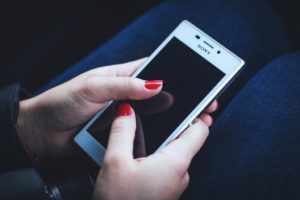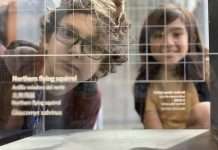 Before my baby was born, my husband and I did not really discuss parenting styles. We knew that all of our best-laid plans would be thrown out the window once we were in the thick of it. We also wanted to enjoy getting to know our daughter and not always be thinking about what we “should” do. There was one big exception which was our (mostly my) use of cellphones. My husband was adamant that cellphones would distract us from spending time with our daughter. I told him I agreed.
Before my baby was born, my husband and I did not really discuss parenting styles. We knew that all of our best-laid plans would be thrown out the window once we were in the thick of it. We also wanted to enjoy getting to know our daughter and not always be thinking about what we “should” do. There was one big exception which was our (mostly my) use of cellphones. My husband was adamant that cellphones would distract us from spending time with our daughter. I told him I agreed.
Then the bullets started flying. In those early days of late night feeds, backwards circadian clocks and 3 a.m. glider parties, my cellphone became my lifeline. I was able to order food, diapers, research how much spit up is too much and update my photostream all while balancing the phone on my boppy and holding my newborn. On many days, my phone became my only portal to the outside world. I was lucky to have friends in other cities and time zones who had infants the same age and we sent encouragements, funny pictures and emojis in the dead of the night. Those one-handed texts from the other side of the country went along way to keeping me sane.
But still I knew my phone had to go even without my husband’s constant reminders. As those early nights stretched into the first weeks and months, we often revisited this topic. My husband and I would talk about being present. Not only had my daughter begun to notice my phone, she also knew when my attention was diverted elsewhere. Sometimes she was curious as to what I was doing and other times cried. I was convinced this was her way of getting me to put the phone down (no mommy guilt there).
As I head back to my therapy practice this month and my time with my daughter is more limited, I am revisiting the cellphone conundrum. I have so few available minutes that to have my phone at arms reach allows me to get things done. And yet, I have so few available minutes that being present for them is vital. My professional life is built on helping people learn, analyze and strengthen their bonds with those around them and so shouldn’t this be a no brainer? No bond is more important that an infant with a parent. And yet, my phone is sitting next to me as I write this (she’s napping, I promise!)
And so, what are the benefits of leaving your phone in your purse during quality family time?
Multitasking is the socially correct way of saying we aren’t 100 percent focused on what we are doing.
Being on our phones means we are half-listening to those around us. When we are half-paying attention, we often miss cues that our children need us. In response, our kids will cry louder, bang toys harder, act out more to get our attention. In the long run, children can learn that they have to be bigger and better in order to compete with our devices for time. When we put our phones away, we are more able to be 100 percent invested in our children. This shows our children that they are important and what they say matters, which ultimately leads to a positive self image.
Eye Contact is SO important.
Eye contact between baby and parents is crucial from the get-go and allows us to be clued in to what our children need. When we are half-paying attention and half-texting, we can miss our children’s cues. I don’t know if any other parent has had the experience where you turn your head while still feeding your infant only to look back and see they are completely covered in milk. Although we can’t be focused all the time, having our phone out means that this situation happens more frequently.
Kids observe their parents and their behaviors constantly.
When my neighbor’s son gets cranky, he is best soothed by looking at pics on her iPhone, similar to adults around her who need to “zone out”. When he was two, he liked to show everyone how he could “swipe like daddy.” When our heads are constantly looking at a screen, our children see us. These interventions work and preschoolers are incredibly computer-savvy, but are these the traits we want them to emulate?
When I was growing up, my parents did not allow a television in the kitchen. This created an environment where we would talk to each other and we typically had lively family meals. Smart Phone usage is the next-generation, high-tech iteration of that same principle. In the end, we have the opportunity to cultivate an environment that doesn’t allow technology to detract from real “facetime” with our families.


















